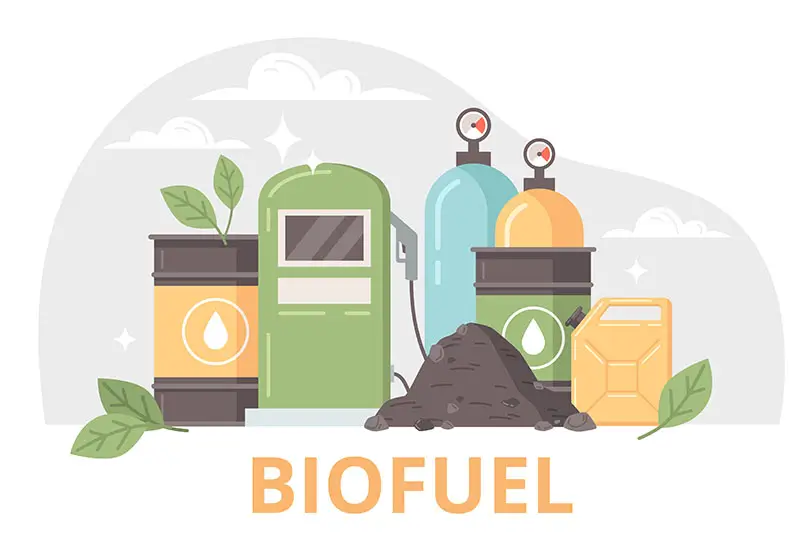Introduction
Biofuels represent renewable energy sources and provide an alternative to the use of fossil fuels, since they are produced out of organic materials like plant matter and animal waste. With the world confronting the realities of climate change, the increasing energy requirements, and economic issues, biofuel production is an important development that would facilitate clean energy production. Biofuels are helping to ensure energy security, reduce greenhouse gasses and also meet environmental sustainability which is critical in long term economic resilience hence become important in future strategies on energy.

Job Creation and Workforce Development
One of the most immediate and measurable effects of biofuel generation is its ability to create jobs. The economic impact of biofuels is largely tied to the expansion of employment opportunities in both rural and urban areas. Biofuel production deals with many processes-cultivation, harvesting, processing, distribution and research, which takes a large amount of manpower.
They include direct jobs in agriculture (production of biomass crops), transport, plant operation and the distributions of fuel. There is also the indirect job creation in the related industries, i.e. equipment manufacturing, logistical services, and maintenance. The ripple effect boosts economic activity and income between regions.
The industry also creates dangerously skilled jobs Software developers Key professionals who are being lured to the field include engineers, environmental scientists, software developers and agricultural technologists. This has resulted in creation of new educational courses and training centers in the area of renewable energy.
As a result, biofuel generation is not only improving the net energy balance of national economies but also enhancing the skill sets of the workforce. The possibilities are being acknowledged by governments at an increasing rate and are awarding grants and incentives to companies that provide green job growth. Overall, this job market expansion is a testament to the positive economic impact of biofuels.
Boosting Rural Economies
Perhaps the most transformative benefit of biofuel generation lies in its contribution to rural economic development. Agricultural waste and non-food crops are being used by farmers, especially in the U.S., Brazil, and India as viable income sources. This change is adding energy to communities that in the past have had few economic prospects.
As an example, American farmers producing corn to be used in ethanol or soy to be used in biodiesel production have experienced constant increase in demand and margins. Sugarcane ethanol has transformed the income base of the rural population in Brazil and in India, small growers have become independent with the use of jatropha and other oilseeds as sources of biodiesel.
Biofuels help farmers to create another source of revenue that assists in lowering the risk factor. They also support creation of host infrastructure such as roads, storage facilities and processing plants. All this development leads to a cycle of reinvestment and growth.
The advantages of biomass fuel in rural areas extend beyond direct income. They encourage local economies, provide resiliency in communities and encourage energy independence. As this industry grows, rural economic development becomes a key driver of national economic progress.
Reducing Dependence on Imported Oil
One of the strategic benefits of biofuel generation is its ability to reduce a country’s reliance on imported fossil fuels. In addition to boosting environmental sustainability, this transition results in high financial savings and economic security.
The economic impact of biofuels is felt in national trade balances. The domestic production of energy enables nations to reduce their importation costs of fuel that are usually vulnerable to world market tensions and fluctuation in fuel prices. Biofuels are reported to have led to a reduction in petroleum imports that has been witnessed since the early 2000s (U.S Energy Information Administration).
Energy independence also unleashes the confidence of the consumer and investor. Transportation expenses are reduced as fuel prices remain steady and this affects the sectors as diverse as agricultural as well as manufacturing industries. The multiplier effect of the savings adds to the growth in GDP.
This reduction in oil dependency also aligns with a favorable net energy balance—a measure of the energy produced versus the energy consumed in the production process. With the increased efficiency of biofuel technologies, this balance is also getting better, adding further weight to the advocacy of home grown energy sources.
Stimulating Innovation and Investment
The rise of the biofuel market has led to increased innovations both in the government and in the commercial areas. Investment in R&D activities is overwhelming the space, with an emphasis on more efficiency in feedstocks, cleaner production and reduced prices. The wave is reaping long run economical gains and making the countries leaders in green technology.
The rise of the biofuel market has led to increased innovations both in the government and in the commercial areas. Investment in R&D activities is overwhelming the space, with an emphasis on more efficiency in feedstocks, cleaner production and reduced prices. The wave is reaping long run economical gains and making the countries leaders in green technology.
There is also an increase in the amount of Private investment. Venture capitalists and large corporations are seeing potential in biofuel generation, funneling funds into startups and scalable solutions. The role of governments is equally important because they provide tax credits, subsidies, and research grants to speed up the process of innovation.
The economic impact of biofuels is amplified by these investments, many of which have spillover benefits in agriculture, transport, and software. Examples of this include precision farming equipment invented to deal with biofuel crops being used in food agriculture, providing overall enhanced productivity. It is apparent that the fuels sector is not only about an energy solution but it is also an economic driver.
Environmental Benefits with Economic Value
Beyond job creation and energy security, biofuels offer critical environmental benefits that carry long-term economic value. One of the most cited advantages is the reduction of greenhouse gas emissions. Compared to fossil fuels, biofuels can reduce carbon emissions by up to 60–90%, depending on the feedstock and production method.
This reduction contributes to climate goals and public health improvements, leading to fewer healthcare costs and environmental clean-up expenses. As a result, the economic impact of biofuels extends to reduced government spending in related sectors.
Carbon credits and government incentives further highlight the financial viability of clean energy. Countries with carbon trading systems reward companies that lower emissions, making biofuel generation more attractive from an investment standpoint. These market mechanisms are essential for encouraging green behavior while delivering tangible economic rewards.
Moreover, the advantages of biomass fuel include the ability to use waste materials—reducing landfill overflow and methane emissions. All these factors contribute to a more sustainable and cost-effective energy future, particularly when evaluated through a long-term lens.
Challenges and Considerations
Despite the promising outlook, biofuel generation is not without challenges. Critics cite land use problems, food-vs-fuel controversies and water resource concerns. There is also the necessity of big-scale projects in infrastructure and thus the draw on government coffers.
These concerns can however, be circumvented with the regulations in place and the application of modern technology. The industry is still developing, becoming more sustainable and diverse with regard to feedstock usage in order to be less reliant on using food crops.
By addressing these concerns, the economic impact of biofuels can remain largely positive, supporting growth without compromising ecological or social values.
Conclusion
In brief, the economic impact of biofuels is extensive and profound. From job creation and rural economy growth in agriculture to improved net energy ratio, the benefits are both long-term and short-term. Outside the environment, some of the benefits of biomass fuel also extend to energy independence, investment, and innovation. As global energy needs continue to increase, the manufacture of biofuels remains a viable, scale-up, and cost-effective option for the future.
Frequently Asked Questions (FAQs)
The economic impact of biofuels includes job creation, reduced oil import costs, innovation in green technologies, and increased rural income. Biofuel generation also attracts investments, helping diversify national energy portfolios and strengthen energy security.
Biofuel generation boosts rural economic development by creating new revenue streams for farmers, encouraging infrastructure growth, and providing employment in agricultural and processing sectors. It revitalizes rural economies, especially in countries like India, Brazil, and the U.S.
The advantages of biomass fuel include lower greenhouse gas emissions, renewable sourcing, waste reduction, and compatibility with existing infrastructure. It also supports local economies and improves the net energy balance when compared to fossil fuels.
Net energy balance measures the energy output from biofuels versus the energy required to produce them. A positive balance means the fuel is energy-efficient. Improved net energy balance increases economic viability and environmental benefits.
By producing energy domestically, countries reduce fuel import bills and protect their economies from global oil price shocks. This contributes to energy independence and is a major economic impact of biofuels, promoting national resilience.












